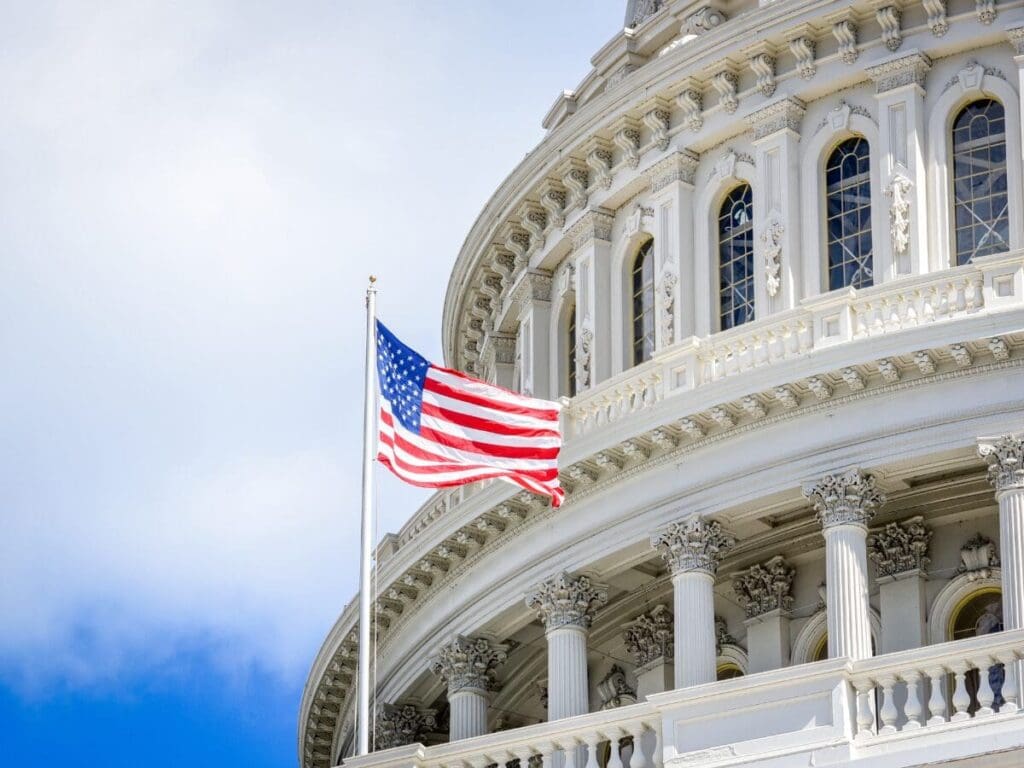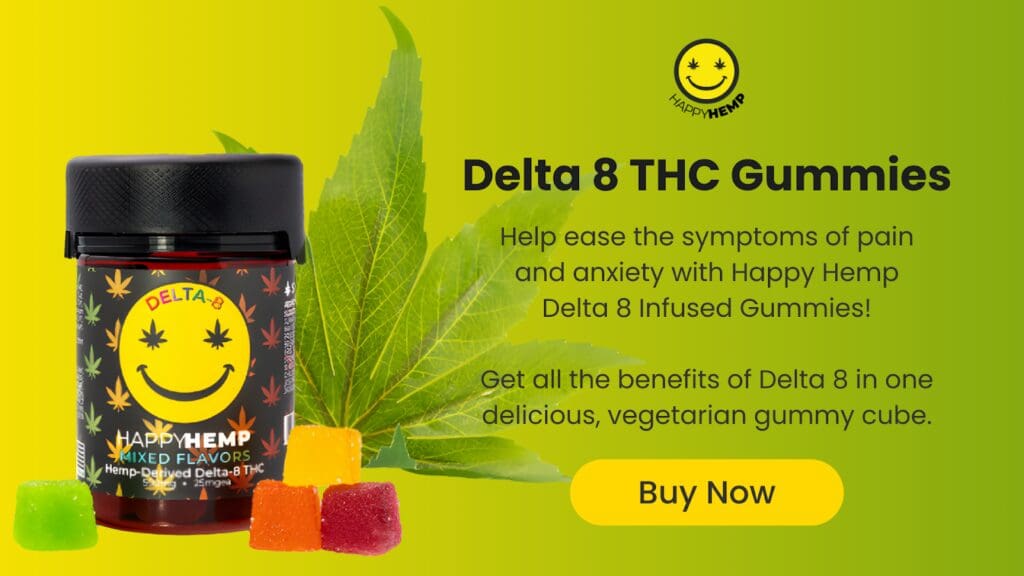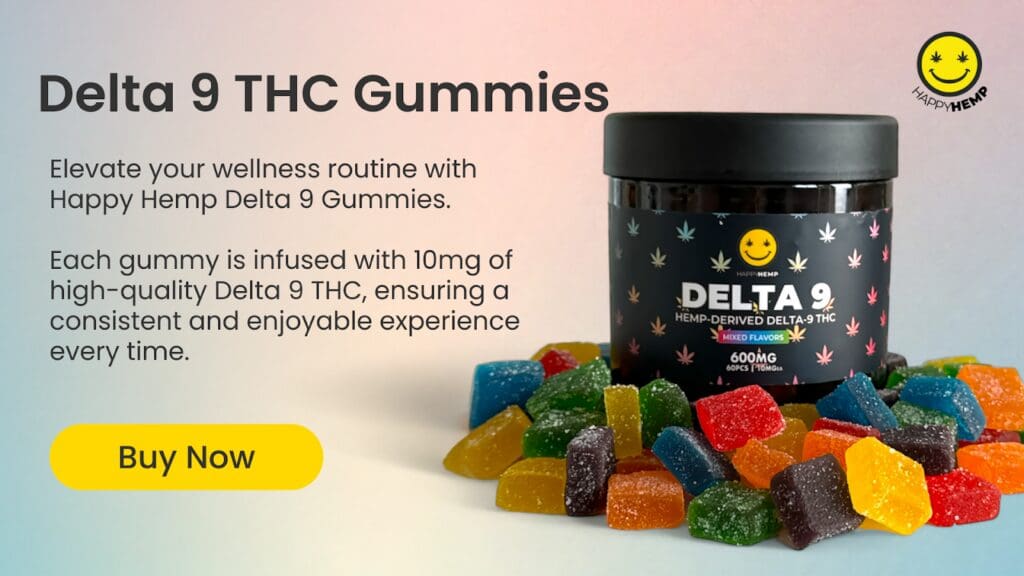Key Takeaways:
- Delta 8’s Legal Status in Washington: Delta 8 THC is currently illegal in Washington State due to regulatory concerns and safety considerations.
- Legal Alternatives for Delta 8: Washington residents can legally access CBD and licensed Delta 9 THC products through regulated dispensaries.
- Future Legal Developments: The future of Delta 8 in Washington depends on federal regulations, public demand, and advancements in safe production practices.
Delta 8 THC, a compound derived from hemp, has been gaining popularity in recent years due to its mildly psychoactive effects that are similar, yet gentler, than those of Delta 9 THC. However, as Delta 8’s popularity has grown, so has the confusion around its legality.
As a trusted source of hemp and Delta 8 products, Happy Hemp is committed to providing clear, up-to-date information on this growing topic. With years of experience in crafting high-quality Delta 8 THC products, we have a deep understanding of the complexities surrounding Delta 8 and its regulation.
In this guide, we’ll discuss the current laws in Washington State regarding Delta 8, exploring what it means for you as a consumer and how you can navigate these regulations confidently.
Understanding Delta 8 THC And Its Effects
Delta 8 THC, or delta-8-tetrahydrocannabinol, is a naturally occurring cannabinoid found in small amounts in hemp and cannabis plants. It shares a similar chemical structure with Delta 9 THC—the compound known for the traditional marijuana high—but offers a gentler effect. Users often describe the experience as clear-headed and calming, with sensations of mild euphoria, relaxation, and reduced anxiety.
This milder effect has made Delta 8 appealing to those seeking a more subtle experience. However, due to its psychoactive properties, Delta 8 remains subject to regulatory scrutiny.
If you’re interested in exploring the benefits of Delta 8, Happy Hemp’s Delta 8 Gummies offer a convenient and enjoyable way to experience its gentle effects. Try them today and discover a smoother, more balanced high for yourself!
Is Delta 8 Legal In Washington?
Delta 8 THC is currently restricted in Washington State. While the 2018 Farm Bill federally legalized hemp and hemp-derived compounds containing less than 0.3% Delta 9 THC, each state has the authority to regulate or ban Delta 8 THC specifically. The Washington State Liquor and Cannabis Board (WSLCB) explicitly prohibits the production, sale, and purchase of Delta 8 THC products within the state.
Washington’s decision is largely based on health and safety concerns. Regulators in the state have voiced worries about the way Delta 8 products are made, as the compound often requires synthetic processing to produce in higher quantities. This has led to additional restrictions to limit public access to Delta 8 THC products.
Washington State Laws On Hemp-Derived Products
Washington’s approach to hemp-derived products like CBD and Delta 8 THC is shaped by a framework focused on regulating psychoactive substances and ensuring consumer safety. Key aspects of Washington’s laws on hemp-derived products include:
Federal Alignment With Exceptions
Washington generally aligns with federal guidelines from the 2018 Farm Bill, which legalized hemp-derived compounds with less than 0.3% Delta 9 THC. However, the state makes specific exceptions for psychoactive compounds like Delta 8 THC, which it treats differently due to its intoxicating effects. This exception underscores Washington’s priority on regulating substances that may impact public safety and health.
Regulation By The WSLCB
The Washington State Liquor and Cannabis Board (WSLCB) oversees all cannabis-related regulations, including Delta 8 THC derived from both hemp and marijuana plants. The WSLCB has officially prohibited the production, sale, and distribution of Delta 8 THC products due to its psychoactive nature. By regulating Delta 8 under these guidelines, the state enforces a clear line between allowable CBD products and restricted THC variants.
Focus On Public Safety
Washington’s Delta 8 restrictions are rooted in consumer protection and health concerns about psychoactive products. The state’s decision reflects worries about unregulated Delta 8 production processes and unknown health effects that could emerge from unchecked consumption. Washington authorities emphasize that the lack of extensive research on Delta 8 THC means there are potential risks not yet fully understood.
Licensed THC Products Only
Washington’s cannabis market is tightly regulated, allowing only licensed Delta 9 THC products to be sold through authorized dispensaries. This means that other THC variants, like Delta 8, do not qualify for legal sales unless specific legislative changes are made. Washington’s strict licensing requirements are designed to keep THC products within a controlled market for safe and lawful access.
Why Is Delta 8 Restricted In Some States?
The restrictions on Delta 8 THC in states like Washington stem from various legal, safety, and regulatory concerns. Although Delta 8 is derived from hemp, its psychoactive properties and the manner in which it’s produced raise important issues for lawmakers and regulators. Here are some of the primary reasons behind its restricted status:
Unregulated Production
Delta 8 THC is primarily synthesized from CBD through a chemical conversion process, which often involves the use of strong solvents and other additives. If these chemicals are not carefully removed, harmful residues can remain in the final product, posing health risks to consumers. This lack of standardized production protocols raises red flags for regulatory bodies concerned about consumer safety.
Lack Of Testing Standards
Unlike Delta 9 THC, which undergoes stringent testing for purity and potency in licensed markets, Delta 8 THC products are frequently sold without these quality assurances. Without strict testing requirements, there can be inconsistencies in potency and the potential presence of contaminants. This absence of regulated testing makes it difficult for consumers to trust the safety and quality of Delta 8 products.
Concerns Over Psychoactive Effects
Although Delta 8 is generally considered less potent than Delta 9 THC, it still induces psychoactive effects, making it appealing to recreational users. Some states view any product with mind-altering properties as a controlled substance, warranting careful oversight. The potential for misuse, especially among minors or those seeking a legal high, further fuels these concerns.
Federal Uncertainty
The 2018 Farm Bill legalized hemp-derived compounds, but the Drug Enforcement Administration (DEA) has expressed concerns regarding psychoactive cannabinoids like Delta 8. This lack of clear federal guidance leaves Delta 8 in a legal gray area, with no consistent regulation across the states. Consequently, many states have chosen to classify it under controlled substances until federal laws provide more clarity.
Legal Alternatives To Delta 8 In Washington
For Washington residents looking for similar effects to Delta 8 THC, there are a few legal alternatives available that comply with state regulations. These alternatives offer varying levels of psychoactivity and therapeutic potential, catering to a range of preferences:
- CBD Products: Hemp-derived CBD (cannabidiol) is legal in Washington and widely available. While non-psychoactive, CBD offers potential calming, anti-inflammatory, and pain-relieving effects without the high associated with THC. CBD products come in various forms, including oils, gummies, capsules, and topicals.
- Delta 9 THC from Regulated Dispensaries: Washington’s cannabis market is well-established, with regulated dispensaries selling Delta 9 THC products for recreational and medicinal use. These products are subject to strict testing for safety and potency, providing a safe option for those seeking the psychoactive effects of THC.
- Full-Spectrum CBD Products: For those looking for the “entourage effect” (where cannabinoids and terpenes work together for enhanced effects), full-spectrum CBD products can be a good choice. These contain a small amount of THC (up to 0.3% Delta 9 THC) along with other cannabinoids, offering a mild experience without significant psychoactivity.
- CBN (Cannabinol) Products: CBN is another hemp-derived cannabinoid that’s gaining popularity for its mild relaxing properties. Though not psychoactive like THC, CBN is often used for its potential calming and sleep-supportive effects, making it an appealing choice for those seeking relaxation.
Future Outlook On Delta 8 Legislation In Washington
As awareness and demand for Delta 8 products continue to grow nationwide, lawmakers and regulatory bodies are likely to revisit hemp-derived cannabinoid regulations. Here are some factors that may shape the future of Delta 8 legislation in Washington:
Federal Guidance On Delta 8
The federal government is currently examining cannabinoids like Delta 8, and more definitive federal guidelines could emerge in the coming years. If agencies such as the DEA or FDA provide clear regulations and safety standards, Washington may opt to align its state laws with these federal recommendations. This potential alignment would create a more standardized approach to Delta 8 across the nation, influencing Washington’s stance.
Public Demand And Market Pressure
The popularity of Delta 8 THC continues to grow, with consumers expressing a desire for safe and legal access to the product. Should this demand increase, Washington lawmakers may face pressure from residents and local businesses to legalize and regulate Delta 8 products. In response to public interest, legislators could consider creating a regulated market similar to what exists for Delta 9 THC.
Advancements In Safety Standards
As production methods for Delta 8 THC improve, manufacturers are likely to develop safer, cleaner methods for its synthesis. With rigorous testing protocols and verified safety procedures, Delta 8 could become a more viable product for state-regulated sale. If industry standards around Delta 8 reach a point where safety and purity can be ensured, Washington may be more open to allowing its regulated distribution.
Comparative State Policies
Many states have adopted varying approaches to Delta 8, with some permitting it and others enforcing restrictions. Should neighboring states legalize and successfully regulate Delta 8 products, Washington might reconsider its current stance to stay competitive and satisfy consumer demand. By observing outcomes in other states, Washington lawmakers could gain insight into effective regulatory frameworks and the impact of legalization.
Final Thoughts
As of now, Delta 8 THC remains illegal in Washington State, with restrictions driven by regulatory caution and a focus on public health. For residents, this means that accessing Delta 8 products legally within the state is not possible under current laws. However, alternatives such as CBD and licensed Delta 9 THC products are available and offer a range of effects for those interested in exploring cannabinoids.
The future of Delta 8 in Washington will likely depend on both federal and state regulatory developments, as well as public interest and advancements in production safety. Until then, consumers are advised to follow the state’s regulations and consider legal options that offer a safe and compliant experience with cannabinoids.
Read also:
- Delta 8 Gummies vs Delta 9: Which Is Better?
- Delta 8 Dosage Guide: How To Find Your Optimal Dose
- Delta 8 For Better Sleep – Discover The Benefits For A Restful Night
Frequently Asked Questions About Delta 8 Legality In Washington
Can I buy Delta 8 online and ship it to Washington?
While some websites may sell Delta 8 online, shipping it to Washington is illegal and may violate both state and federal regulations.
Is Delta 10 THC legal in Washington State?
Delta 10 THC, like Delta 8, is also banned in Washington due to similar psychoactive properties and regulatory concerns.
What penalties could I face for possessing Delta 8 in Washington?
Penalties vary based on the amount and context but may include fines, confiscation, and other legal consequences similar to those for Delta 9 THC possession.
Are any other states banning Delta 8 THC?
Yes, several other states, such as Colorado, Alaska, and Nevada, also restrict or ban Delta 8 due to health and safety concerns.
Is there any way to legally consume Delta 8 in Washington?
No, Delta 8 is currently illegal to manufacture, purchase, possess, or consume in Washington State.
Can medical marijuana patients access Delta 8 in Washington?
No, Washington’s medical marijuana program does not include access to Delta 8; only regulated Delta 9 THC products are allowed.
How can I advocate for Delta 8 legalization in Washington?
Interested citizens can contact state legislators, participate in public comment periods, or join advocacy groups focused on cannabinoid rights.
Can I find Delta 8 in Washington CBD stores?
No, licensed CBD stores in Washington cannot legally carry or sell Delta 8 products due to state regulations.
Sources:
- Leas, E. C. (2021). The hemp loophole: a need to clarify the legality of delta-8-THC and other hemp-derived tetrahydrocannabinol compounds. American Journal of Public Health, 111(11), 1927-1931.
- Leas, E. C., Nobles, A. L., Shi, Y., & Hendrickson, E. (2022). Public interest in∆ 8-Tetrahydrocannabinol (delta-8-THC) increased in US states that restricted∆ 9-Tetrahydrocannabinol (delta-9-THC) use. International Journal of Drug Policy, 101, 103557.
- Agriculture Improvement Act of 2018, H.R. 2, 115th Cong. (2018). https://www.congress.gov/bill/115th-congress/house-bill/2









